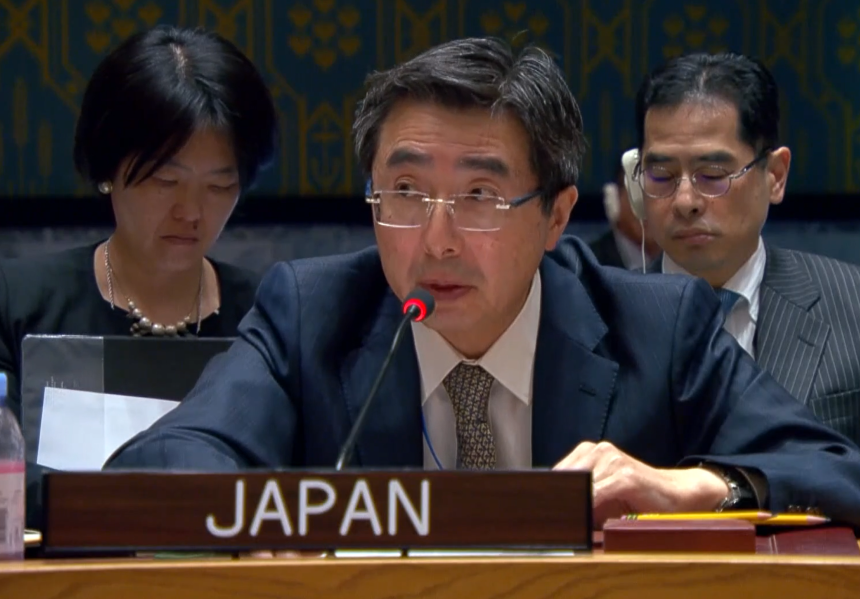Statement by H.E. Ambassador ISHIKANE Kimihiro, Permanent Representative of Japan to the United Nations, at the United Nations Security Council Briefing, Agenda item “The situation in Mali”
2023/4/12

(As delivered)
I thank Special Representative Wane for the insightful briefing. I also welcome the participation of the representative of Mali.
Japan expresses its sincere condolences to the families of those peacekeepers who have lost their lives in the service of MINUSMA, including the three Senegalese peacekeepers killed in February. Japan appreciates and fully supports the work of MINUSMA.
I want to start by reiterating Japan’s determination to stand by the people of Mali and their desire for peace and stability. We must keep their aspirations foremost in our minds as we discuss this issue here in the Council. The best way forward toward achieving lasting peace is to strengthen cooperation among all stakeholders, domestically, regionally, and internationally, including this Council and MINUSMA.
Japan notes the progress made towards the return to constitutional order. Securing a safe political and civic space for all concerned parties to express their views and engage in political dialogue is essential as the country prepares to conduct free, fair and transparent elections to complete the democratic transition in Mali by March 2024.
The 2015 Peace and Reconciliation Agreement is the only existing framework to achieve durable peace and reconciliation, and its implementation should go hand in hand with the democratic transition. The role played by the International Mediation is ever more important, including such effort as was announced last Friday aimed at relaunching the implementation of the Peace Agreement.
For a stable and prosperous society, civil society plays an important role. It is also imperative for the Council to hear the diverse voices of a variety of actors, including civil society. No one should experience intimidation before and after briefing the Council.
Mr. President,
The worsening security situation, now also in the South, is alarming. We recognize the efforts by Malian forces to address the situation. At the same time, Japan echoes the Secretary-General’s view stressing that efforts to foster social cohesion, address structural fragility, deliver basic services, and ensure respect for human rights and international humanitarian law must accompany security operations.
Japan commends the continued commitment by MINUSMA to fulfil its mandate while facing difficulties, including restrictions on its freedom of movement that not only constrain its work but also threaten the safety and security of its peacekeepers. We stress the importance of enhanced cooperation between the Malian transitional authorities and MINUSMA.
As the Council discusses the MINUSMA’s mandate renewal in the coming months, Japan will continue to work closely with the members of the Council and all other stakeholders, taking into consideration various elements such as the four parameters identified by the Secretary-General’s internal review and the significant role MINUSMA plays in ensuring Mali’s peace and stability, as well as the humanitarian and development needs of the Malian people.
I thank you.
Japan expresses its sincere condolences to the families of those peacekeepers who have lost their lives in the service of MINUSMA, including the three Senegalese peacekeepers killed in February. Japan appreciates and fully supports the work of MINUSMA.
I want to start by reiterating Japan’s determination to stand by the people of Mali and their desire for peace and stability. We must keep their aspirations foremost in our minds as we discuss this issue here in the Council. The best way forward toward achieving lasting peace is to strengthen cooperation among all stakeholders, domestically, regionally, and internationally, including this Council and MINUSMA.
Japan notes the progress made towards the return to constitutional order. Securing a safe political and civic space for all concerned parties to express their views and engage in political dialogue is essential as the country prepares to conduct free, fair and transparent elections to complete the democratic transition in Mali by March 2024.
The 2015 Peace and Reconciliation Agreement is the only existing framework to achieve durable peace and reconciliation, and its implementation should go hand in hand with the democratic transition. The role played by the International Mediation is ever more important, including such effort as was announced last Friday aimed at relaunching the implementation of the Peace Agreement.
For a stable and prosperous society, civil society plays an important role. It is also imperative for the Council to hear the diverse voices of a variety of actors, including civil society. No one should experience intimidation before and after briefing the Council.
Mr. President,
The worsening security situation, now also in the South, is alarming. We recognize the efforts by Malian forces to address the situation. At the same time, Japan echoes the Secretary-General’s view stressing that efforts to foster social cohesion, address structural fragility, deliver basic services, and ensure respect for human rights and international humanitarian law must accompany security operations.
Japan commends the continued commitment by MINUSMA to fulfil its mandate while facing difficulties, including restrictions on its freedom of movement that not only constrain its work but also threaten the safety and security of its peacekeepers. We stress the importance of enhanced cooperation between the Malian transitional authorities and MINUSMA.
As the Council discusses the MINUSMA’s mandate renewal in the coming months, Japan will continue to work closely with the members of the Council and all other stakeholders, taking into consideration various elements such as the four parameters identified by the Secretary-General’s internal review and the significant role MINUSMA plays in ensuring Mali’s peace and stability, as well as the humanitarian and development needs of the Malian people.
I thank you.
